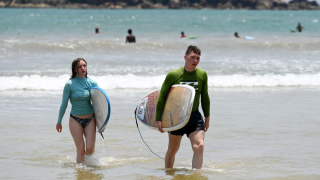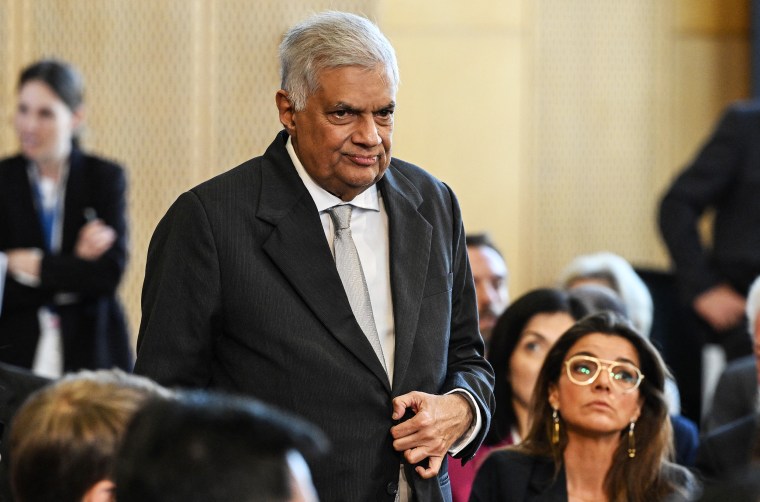
The party may be over for thousands of Russian tourists who moved to Sri Lanka amid the war in Ukraine, NBC News reports.
Authorities in the South Asian island nation said this week they were canceling long-term tourist visa extensions — a move that coincides with outrage over what appeared to be a “whites only” event organized by a Russian-run nightclub in a popular resort town.
But the debt-stricken island’s president raised doubts over whether his government would go through with the cancellations, which would threaten a much-needed source of tourist income.
Russian and Ukrainian tourists must leave Sri Lanka by March 7 after the expiration of their final free visa extension, according to a notice issued by the Tourism Development Authority. The Immigration Department had said last month that the visas were being extended due to the “non-operation of airlines in the region.”
Get top local stories in Philly delivered to you every morning. Sign up for NBC Philadelphia's News Headlines newsletter.
However, President Ranil Wickremesinghe ordered an investigation into the notice, saying the visas could not be canceled without cabinet approval.
“The Govt hasn’t officially decided to revoke visa extensions previously granted to these tourists,” his office said Sunday in a post on X.
U.S. & World
Stories that affect your life across the U.S. and around the world.
Facing sweeping travel restrictions after the Kremlin’s full-scale invasion of Ukraine two years ago, many Russians flocked to Sri Lanka when it offered near-indefinite stays. Russia became Sri Lanka’s largest source of tourists after nearby India last year.
Nearly 200,000 Russians and 5,000 Ukrainians visited the country of 22 million last year, official Sri Lankan tourism department data showed.
It’s unclear how many of those remained in the country beyond the usual duration of a tourist visa, which is 30 days. But thousands are believed to have remained — including those seeking to avoid being drafted into the military — and some have set up restaurants and nightclubs.
It is also unclear whether the end of the visa extensions was related to the recent outcry, but one of those nightclubs was at the center of the outrage over a planned party.
A poster advertising a “White Party” last weekend at the Sarayka Lounge in Unawatuna, a coastal town about 3 miles from the southern tourist hub of Galle, specified a white dress code as is typical for such events.
But the poster, which was shared widely on social media and seen by NBC News, also included a line that said “Face Control: White,” drawing outrage from social media users who interpreted it to mean that only white people could attend the event.
Three Russian DJs were expected to play at the event, according to the poster.
In a post on Instagram last Friday, the bar said it had canceled the event and “will never support various racist statements or organizations.”

A user who claimed to be one of the party’s organizers apologized on Instagram, saying “There was no malice or racism in this.”
“We were sitting in a cafe and discussing that people living far from their homeland have a lot in common and it would be great to gather everyone in one place,” the user, @geo_ecstatic, said.
“We wanted to meet expats who have been living here for a long time and love Sri Lanka,” the user said, adding that he and his family had to leave the island due to abuse and threats arising from “this stupid idea of making a white party.”
In a statement about the “controversial night event,” the Russian Embassy in Colombo said, “according to unconfirmed data, the main promoter as well as the owners of a bar who agreed to accommodate the party are Russian citizens.”
Russia “strongly condemns all forms of racial discrimination,” it added, calling on its citizens to follow local laws and customs.
Sri Lanka has been struggling with an economic crisis since declaring bankruptcy two years ago with more than $83 billion in debt. More than half of that debt is owed to foreign creditors, with the worsening living conditions in the country leading to widespread protests and the ousting of then-President Gotabaya Rajapaksa in 2022.
Since then, the new administration has been pulling out all the stops to raise more cash, including a bailout by the International Monetary Fund and an increase in taxes and prices for electricity and fuel.
The increased cost of living has pushed some Sri Lankans to the streets again, with the police resorting to tear gas to quell a protest in the country’s capital, Colombo, last month.
Sri Lanka has also tapped into tourism, providing 30-day visas with multiple extensions of up to six months, with Russians and Ukrainians receiving even more due to the war in Ukraine.
This story first appeared on NBCNews.com. More from NBC News:



